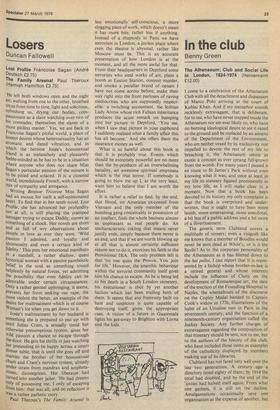Losers
Duncan Fallowell
Lost Profile Francoise Sagan (Andre Deutsch £2.75) The Family Arsenal Paul Theroux (HaMish Hamilton 0.75) 'He left both windows open and the night ail', wafting from one to the other, breathed on us from time to time, light and solicitous, refreshing us, drying our bodies, comPassionate as a slave watching over two of his comrades, themselves the slaves of a More pitiless master.' Yes, we are back in Prancoise Sagan's pitiful world, a place of honest desires whose heterosexuality has an aromatic and dated vibration, and in Which the heroine Josee's homosexual friend is as melancholy and pleasantly feeble-minded as he has to be in a situation Where anyone who does not share Miss Sagan's particular passion of the minute is to be pitied and solaced. It is a closeted world, incredulously French, with a narrow mix of sympathy and arrogance. • Writing Bonjour Tristesse Miss Sagan had an excuse for such a self-opinionated heart. To find that in her tenth novel, Lost Profile, she has advanced her profundity not at all, is still playing the cramped teenager trying to escape Daddy, comes as something of a shock. Her novels are short and as full of wry observations about People, in love as ever they were. 'Wild Passion I admired, and loyalty and sPontaneity and even a certain kind of fidelity,' This puts her emotional manifesto in a nutshell, a rather shallow, quasi hysterical woman with a passive pantheistic belief in the soul as something tossed helplessly by natural forces, yet admitting the possibility that even fidelity can be admirable under certain circumstances. Only a rather genteel upbringing, it seems, Prevents her from seeking out rape, the more violent the better, an example of the desire for maltreatment which is of course Woman's lot when you get down to it.
Josee's maltreatment by her husband is something she is prepared to put up with until Julius Cram, a sexually timid but Otherwise presumptious tycoon, gives her Wild passion a chance to escape through the door. He gets his thrills in just watching her pretending to be happy across a smart dinner table, that is until she goes off and marries the brother of her homosexual chum and Cram's nervous system, already under strain from mandrax and amphetanines, disintegrates. Her liberator had turned into another jailer. 'He had dreamt Only of possessing me, I only of escaping from him: that was all, and on reflection it was a rather pathetic story.' Paul Theroux's The Family Arsenal is less emotionally' self-conscious, a more slogging piece of work, which doesn't mean it has more bite, rather less if anything. Instead of a rhapsody in Paris we have terrorism in London, a joyless place where even the theatre is abysmal, rather like Moscow must be. This is an accurate presentation of how London is at the moment, and all the more awful for that. From their headquarters in Deptford some terrorists who steal works of art, plant a bomb at Euston Station, commit murder, and smoke a peculiar brand of opium I have not come across before, make their way right into the front parlours of raving mediocrities who are supposedly respectable: a twitching accountant, the lesbian Lady Arrow whose rich Fabian inheritance produces the acute remark on bumping into her picture in Deptford, 'You see, when I saw that picture in your cupboard I suddenly realised what a family affair this has all become.' And she offers them the insurance money as well.
What is so hateful about this book is that it is probably true. Events which should be extremely powerful are no more than the by-products of an overwhelming banality, an awesome spiritual emptiness which is the true terror. If somebody is going to blow me up I, at the very least, want him to believe that I am worth the effort.
It is rather a relief to find, by the end, that Hood, an American ex-consul from Vietnam and the only member of the bombing gang conceivably in possession of an intellect, finds the whole business almost as unpleasant as real people do. An uncharacteristic inkling that means never justify ends, simply because there never is an end, and that if we are worth blowing up at all that is almost certainly sufficient reason not to do it, exorcises his faith in the Provisional IRA. The only problem left is that `no one quits the Provos. You join for life.' However, the anarchic behaviour within the terrorist community itself gives him his chance to escape. As he is being led to his death in a South London cemetery, his executioner is shot by yet another faction which has been trailing both of them. It seems that any fraternity built on hate and suspicion is quite capable of destroying itself, given the appropriate cues. A vision of a future in Guatemala lights his get-away to Brighton with Lorna and the kids.


































 Previous page
Previous page